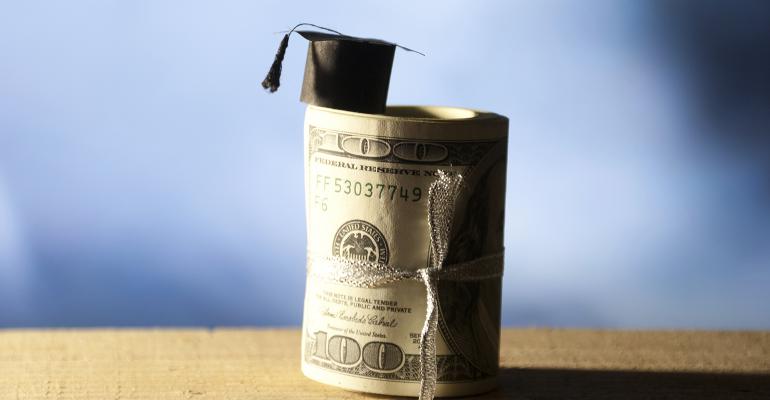(Bloomberg) -- Student loan borrowers flush with cash aren't holding out hope for forgiveness any longer.
With interest set to start accruing on federal student loans again in September after a three-year pause, a cohort of borrowers with savings to spare is preparing to pay off their loans in full.
For years, borrowers held out hope that President Joe Biden would discharge at least a portion of their student debt. Financial experts even advised not paying the loans during the pandemic-era payment freeze until there was more clarity. But after the Supreme Court struck down the president’s plan to eliminate up to $20,000 in loans per person, some borrowers say they aren’t willing to wait around anymore.
That’s the case for Will Nielsen in DeKalb, Illinois. The 33-year-old retail manager was able to save anywhere from $500 to $700 a month during the payment pause.
He was eligible for $20,000 in forgiveness, meaning the program would have wiped away his entire balance of $16,300. But with Biden’s relief plan now firmly in the rearview mirror, Nielsen said he’s planning to pay off the loans so he’ll be debt free and can start saving for a house.
“When Biden announced the plan, I didn't think it would pass,” he said. “I was hopeful, but I thought it would get struck down by the courts.”
Pandemic Savings
Paying off loans, or even just making the required payments, isn’t easy for many borrowers. The payment pause was enacted at the start of the pandemic when many workers found themselves either furloughed, laid off or hit with unexpected expenses.
The average US household with student debt had a balance of $59,460 last year, according to a NerdWallet survey released in January. Women tend to hold higher student-loan balances than their male peers, and Black and Latino borrowers are in debt longer than their White counterparts.
The majority of borrowers didn’t make a single payment on their student loans between August 2020 and December 2021, according to the Federal Reserve. Now that the bills are coming due, some say they’ll refuse to pay. Others have socked away cash and are ready to be rid of the debt.
Jason Gutierrez, a 34 year old in South Carolina, paid down his loans in the early months of the pandemic, wiping out the last $9,000 of his $50,000 balance. After Biden announced the one-time debt forgiveness plan, Gutierrez requested a refund, hoping the debt would be forgiven.
With the forgiveness plan facing legal challenges, he put the money aside in a high-yield savings account. And while he and fiancée have debated whether to zero out the balance, at this point they plan to make monthly payments while the cash earns 4.3% interest in a high-yield savings account.
“I've got the money to repay it set aside,” he said. “It's just a shame just to get so close to forgiveness and then have it yanked away.”
Even if one can afford to pay off a student loan, it may not be the best decision, according to financial planners. Depending on a borrower’s income, other debts and interest rate, it could make sense to use the extra money to invest, make a down payment on a house or earn interest in a high-yield savings account.
“This is called interest-rate arbitrage: borrow low and invest high,” said Francisco Ayala, a financial life planner at The Coleridge Group. “The problem with this strategy is that borrowers can become over-levered and create excessive financial risk on their cash flow.”
For others, the mental relief of paying off their student loans is what’s most appealing. Erin Jamieson, a 31 year old living in Cincinnati, Ohio, graduated with about $23,000 in federal student loans after getting undergrad and graduate degrees in English. By living with her parents for several years and cutting her expenses to just the bare necessities, she was able to reduce that balance to about $13,000 by the time the pandemic started.
After watching Biden’s forgiveness plan get struck down — she was eligible for $10,000 in relief — she decided to pay off the entirety of her balance in July before interest restarted.
“Even if something happens way in the future with forgiveness, I would be paying more and more in interest,” Jamieson said. “I just didn't want to give them more interest. I’m glad to just not worry about it and move on.”
To contact the authors of this story:
Ella Ceron in New York at [email protected]
Claire Ballentine in New York at [email protected]





